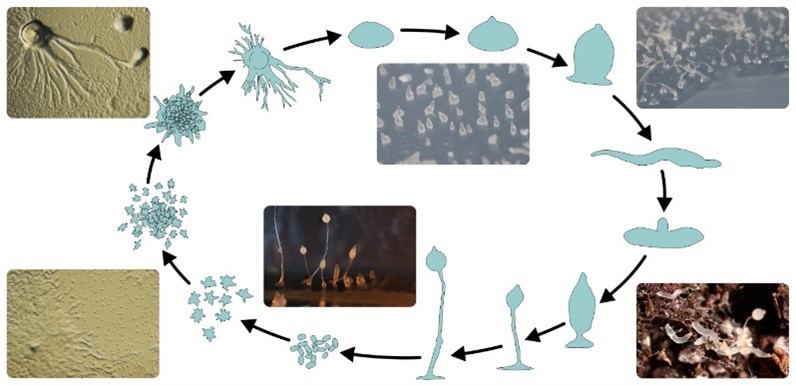Researchers Demonstrate that Group Selection is Sufficient for Simple Multicellularity
Researchers from Eötvös Loránd University and the Institute of Evolution at the HUN-REN Centre for Ecological Research investigated the evolution of multicellularity by simulating two types of cells, cooperators and cheaters, in temporally heterogeneous spatial environments within their model. The results, published in PLOS Computational Biology, show that cooperators can survive in alternating environments due to group selection enabled by spatiality, without any further mechanism needed.
There is an ongoing debate about how and why multicellularity emerged many times independently and what factors contributed to its prevalence. There are many theories why it was advantageous to be multicellular. Factors with direct advantages for aggregation (such as avoiding predation) are evident but there are factors with indirect advantages, such as spatiality and a variable environment. The latter can ensure the survival of the cooperative trait through group selection, without kin recognition or selection towards larger size (predation). In their model, the researchers investigated this hypothesis by modelling two types of cells in temporally heterogeneous spatial environments.

The life cycle of Dictyostelium discoideum. (Image credit: Wikimedia, Wikipedia) (Credit: Tyler Larsen, Wikimedia)
Cooperators produce an adhesive with which they can associate to form aggregates, while cheaters enjoy the benefits of the aggregate without producing the adhesive glue. In resource-rich environments, cooperators have a disadvantage due to slower growth, but only they can create propagules in resource-poor environments. Cheaters therefore need to piggyback propagule-forming cooperators to make it to the next rich habitat.

Multicellular fruiting bodies of the slime mold Dictyostelium discoideum (Source: wikipedia, wikimedia)
They also examined various colonisation mechanisms (dispersion, fragmentation, aggregative sporulation, etc.) and found that only aggregative propagation mechanisms can maintain cooperation robustly and in the long term in an alternating environment. That is, in such environments, group selection is more important than individual selection in maintaining cooperation. The results suggest that these mechanisms may have played a key role in the evolutionary emergence of aggregative multicellular organisms.

In a nonchanging environment, predation is sufficient to give a chance for cooperators (top right). However, without predation, cheaters always win (top left). When there is a need to colonise new habitats, random dispersion decreases the chance of cooperators by disrupting aggregations (middle). Aggregation-based colonisation can maintain cooperators against cheaters with and even without predation (bottom left).

